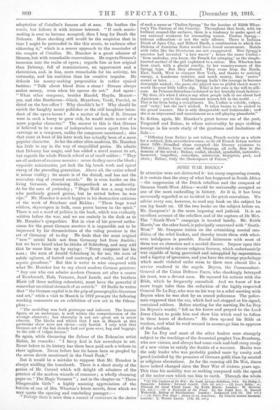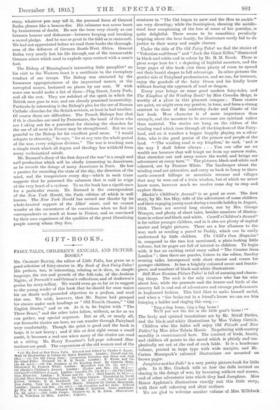SOME WAR. BOOKS.*
Is attention were not. distracted b., too many engrossing events, it is certain that the story of what has happened in South Africa —the suppression of the Dutch rebellion and the conquest of German South-West Africa--would be universally accepted as one of the most enthralling in history. As it is, it has been necessarily regarded as an incident in the great convulsion. We advise every one, however, to read any book on the subject he can lay hands on. Of the two books on the subject before us, Mr. Sampson's1 is the more imposing and judicial. It is an excellent account of the rebellion and of the capture of De Wet.. The " South-West " campaign is treated briefly. Mr. Keith Morris,2 on the other hand, is peincipally concerned with " SOuth- West." Mr. Sampson insists on the astonishing mental con- dition of the rebel leaders, and thereby treats them with what- ever indulgence is possible. Racial bitterness with most of them was an obsession and a morbid disease. Impose upon this mental material a sincere religious fervour, which unfortunately. was capable of being perverted and misapplied by superstition and a bigotry of ignorance, and you have the strange psychology. which made violated oaths seem to these men almost like a service rendered to the angels. Beyers, the Commandants General of the Union Defence Force, who shockingly betrayed his trust, was a devout man. He squared his actions. with the Bible, which he frequently consulted. And we know of few more tragic tales than the seduction of the highly respected General De La Rey, who was on his way to a rebel meeting with Beyers when ho was shot by an armed policeman The police, man supposed that the car, which had not stopped at his signal, contained robbers. Before starting for the meeting De .La Rey (in Boyers's words)." fell on his knees and prayed to the Lord Jesus Christ to guide him and show him which road to follow in these hours of darkness." He then opened his Bible at random, and what he read seemed to encourage him to approve. of the rebellion:
De La Rey and most of the other leaders were strangely subject to the teachings of the demented prophet Van Rensburgs who saw visions, and always had some cock-and-hull story ready of a new vision to satisfy the doubts of a waverer. Merits was.. the only leader who was probably guided more by vanity ands 'greed (satisfied by the promises of German gold) than by. mental or religious aberrations. As for the cunning old De. Wet, times. have indeed changed since the Boer War of sixteen years ago. This time his mobility was as nothing compared with. the speed.. of the motor-cars which ran him to earth, Through the whole
• (1) The Capture of .De Wet the South African Rebellion, 1014, By Philip :Y. Sampson: London Edward Arnold. ROL ed. net.]—(2) Louis Botha; or, Through the Grad Third Land. By. Keith Morrie. London : W. Stevens. Ds. net.]--(5) A Fortnight at the Front. By the Right Key. IL, Russell Wakefield, Bishop of Birmingham. London : Lonlmans and 03. led. net" Paris War Days : Diary of an American. By Charles 11111101 Barnard. L011‘1011: T. Werner Laurie. flOs. Od. net.]
story, whatever pen may tell it, the personal force of General Botha gleams like a beacon-fire. His calmness was never beset by brainstorms of doubt. He saw the issue very clearly as one between honour and dishonour—between keeping and breaking a sacred pledge. And he was as great in the field as in statecraft. We had not appreciated before we read these books the thorough- ness of the defences of German South-West Africa. General. Botha very nearly lost his life through, one of the innumerable German mines which used to explode upon contact with a man's foot.
The Bishop of Birmingham's interesting little pamphlet' on his visit to the Western front is a certificate to the exemplary conduct of our troops. The Bishop was attracted by the humorous appropriateness of the improvised names, or the corrupted names, bestowed on places by our men. W wish some one would make a list of these—Plug Street, Lorry Park, and all the rest. They are redolent of the spirit in which the British race goes to war, and are already promised immortality. Particularly interesting is the Bishop's plea for the use of Roman Catholic churches for the British services, at least in bad weather. Of course there are difficulties. The French Bishops fear that if th.:ir churches are used by Protestants, the hand of those who are (coking out for a precedent for claiming the. churches for the use of all sects in :France may be strengthened. But we are grateful to the Bishop for his excellent good sense. " I would relegate to obscurity," he says, " for at any rate tho whole period of the war, every religious division." The war is teaching men a simple truth which all dogma and theology has withheld from many ecclesiastical minds.
Mr. Barnard's diary of the first days of the wars is a rough and fug production which will be chiefly interesting to. Americana, as he records the doings of many Americans in Paris. He has a passion for recording the state of the sky, the direction of the wind, and the temperature every day—which in such times suggests that he possessed the calmness that is said to, reign
at 'the very heart of s cyclone. To us-the book has a significance for a particular reason. Mr. Barnard is the correspondent
of the New York Herald, the Paris edition of which. is well known. The New York Herald has earned our thanks by its wholerhearted support of the Allies' cause, and we cannot. wonder at the earnestness of its convictions when we find its correspondents so much at home in France, and so convinced by their own experience of the qualities of the great liberalizing people among whom they live.











































 Previous page
Previous page